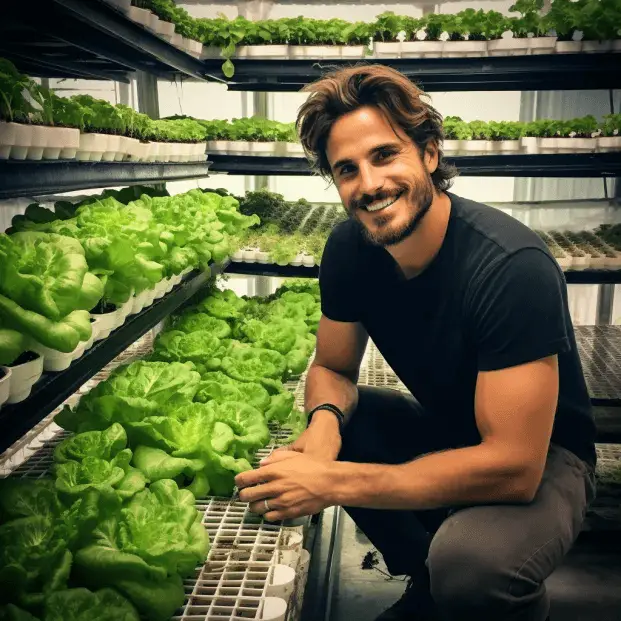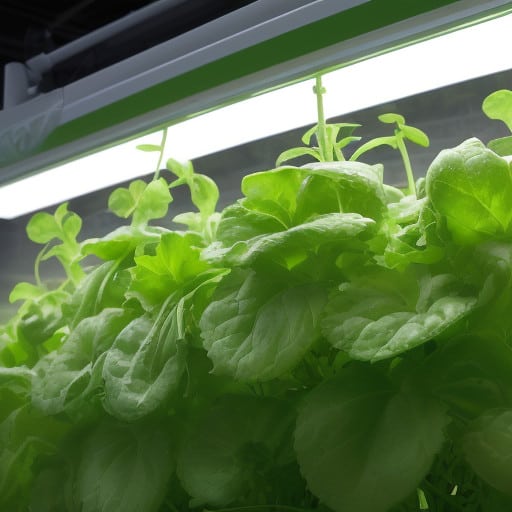According to hydroponics expert Dr. Emily, “it is not possible to grow hydroponics without nutrients. Nutrients play a vital role in providing essential elements for plant growth in a soilless system. However, there are alternative approaches and nutrient solutions that can be explored to optimize hydroponic cultivation.”
Are you curious to learn more about the fascinating world of hydroponics and how to achieve optimal growth?
In this guide, we’ll delve into the importance of nutrients in hydroponic gardening and uncover strategies to maximize your plant’s potential.
We’ll explore different nutrient solutions, share practical tips, and reveal lesser-known secrets that can take your hydroponic garden to new heights.
So, if you’re ready to unlock the nutrient-rich path to thriving plants, keep reading and embark on a journey of hydroponic success.
Key Takeaways
Hydroponics can thrive without traditional nutrients. Systems like aquaponics use fish waste, while aeroponics delivers nutrients through misting. These innovative methods foster thriving plant growth without conventional solutions.
Overview of the Topic
Can You Grow Hydroponics Without Nutrients?
Plants need nutrients to survive and thrive, just like humans need food. In hydroponics, where plants grow without soil, providing the right nutrients is essential. But is it really possible to grow plants hydroponically without adding any nutrients at all? Let’s explore!
The Short Answer
- No, you cannot grow plants hydroponically without adding nutrients to the water.
- Plants require 17 essential nutrients to grow and complete their life cycle.
- Even if you start with nutrient-rich water, the plants will eventually deplete those nutrients.
Why Plants Need Nutrients
- Nutrients are the “food” plants use to build tissues and carry out biological processes.
- The 17 essential nutrients include macronutrients like nitrogen, phosphorus and potassium that plants need in large quantities.
- There are also micronutrients like iron, boron and zinc that plants need in smaller amounts.
- Without these nutrients, plants cannot create energy, build cell structures, regulate water movement or complete other vital functions.
The Nutrient Solution
To grow plants hydroponically long-term:
- Use a premixed hydroponic nutrient solution containing all required nutrients
- Or make your own nutrient solution by combining individual nutrient salts
- Monitor nutrient levels with EC/PPM meters and replenish as needed
- Ensure the nutrient solution has the proper pH level of 5.5-6.5
Growing hydroponically is all about providing plants with the perfect nutrient-rich environment. While short nutrient cycles exist in nature, adding a nutrient solution is required for viable hydroponic crop production.
The Reality of Growing Hydroponics Without Nutrients
While it’s theoretically possible for plants to survive briefly without added nutrients, this method is highly unsustainable for hydroponic growing. Let’s dive into the reality of trying to grow without a nutrient solution.
Brief Survival Without Added Nutrients
- Seeds may germinate and seedlings sprout using stored energy reserves
- Young plants can grow temporarily by using up existing nutrients in the water
- But this initial growth period without added nutrients is very short-lived
Unsustainability of This Method
- Plants CANNOT complete their full life cycle without an ongoing nutrient supply
- Existing nutrient levels get depleted as plants absorb them for growth
- Without nutrient replenishment, plants become stunted and STOP growing altogether
Consequences of Nutrient Deficiencies
Depriving plants of essential nutrients leads to:
- Stunted growth and weak, feeble plants
- Failure to develop robust root systems
- Increased susceptibility to diseases and pests
- Poor flowering, fruiting or propagation
- Complete crop failure and inability to harvest (1)
Why Nutrients Are Essential
Plants require certain elements to sustain vital biological processes:
Macronutrients needed in large amounts:
- Nitrogen for foliage growth
- Phosphorus for root development
- Potassium for overall vigor
Micronutrients needed in smaller quantities:
- Iron for chlorophyll production
- Calcium for cell wall structure
- And many more…
A complete hydroponic nutrient solution provides these essential elements in perfect balance. It’s the “liquid fertilizer” that enables hydroponically-grown plants to thrive.
Effects of Nutrient Deprivation
Without this nutrient supply, multiple deficiencies arise, causing:
- Stunting and deformities
- Discolored, dying leaves
- Increased pest/disease vulnerability
- Failure to flower or fruit properly
- An inability to complete life cycles
| Deficient Nutrient | Visible Symptoms |
| Nitrogen | Yellowing of older leaves |
| Phosphorus | Purple discoloration, poor flowering |
| Potassium | Browning of leaf tips/edges |
In essence, trying to sustain hydroponic growth without added nutrients is utterly unsustainable long-term. Proper nutrient solutions are critical for productive hydroponic systems.
Alternatives to Consider
While it’s not feasible to grow hydroponically long-term without adding nutrients, there are some alternative options to explore beyond synthetic nutrient solutions.
Organic Hydroponic Nutrient Options
For those seeking an organic approach, there are certified organic hydroponic nutrients available:
Source: Keep on Growin’ with Mike VanDuzee
- Plant/Seaweed Extracts – Provide nitrogen, potassium, trace minerals
- Bat Guano – An excellent source of phosphorus and micronutrients
- Rock Dust – Releases minerals like calcium, iron, magnesium over time
Benefits of Organic Alternatives
- Avoids synthetic chemicals and mineral salts
- Provides a natural source of nutrients
- Slower nutrient release can stabilize solution levels
Considerations
- May be more expensive than synthetic nutrients
- Require closer monitoring of nutrient levels
- Potential issues with purity and consistency
Utilizing Compost Tea
Another alternative is using compost tea as a nutrient supplement:
- Compost tea is a brewing of compost or vermicompost in water
- It extracts and suspends the nutrients from the decomposed organic matter
- The nutrient-rich “tea” can then be added to hydroponic systems (2)
Application Method
- Brew a high-quality compost tea every 1-2 weeks
- Add a small amount (5-10%) to the hydroponic reservoir
- Provides a boost of micronutrients, enzymes and beneficial bacteria
Benefits
- Sustainable source of micro and macronutrients
- Adds beneficial microbes that support plant health
- An affordable way to supplement nutrients
- Great for organic hydroponic production
While switching entirely to organic nutrient sources requires diligence, they offer a natural alternative for supplementing hydroponic systems. Exploring these options can be rewarding for sustainable growers.
Conclusion
In the world of hydroponics, the idea of growing without nutrients may seem intriguing, but the reality tells a different story.
While plants might endure briefly sans added nutrients, it’s not a sustainable path to vibrant growth.
Nutrients like nitrogen, phosphorus, and potassium are vital for flourishing plants, ensuring sturdy stems and vibrant foliage.
Without them, plants suffer, stunting their potential and inviting diseases.
Embracing proper nutrient management is essential for successful hydroponic gardening, prioritizing plant health and robust growth.
So, while the notion may spark curiosity, the truth remains: nutrients are the cornerstone of thriving hydroponic systems.
Join the conversation! Share your thoughts on nutrient management in hydroponics below.
References
- https://proponics.co.uk/blogs/nutrients/nutrient-deficiencies-in-hydroponics
- https://taphydro.com/blogs/news/why-you-need-compost-tea-and-how-to-make-it
Related Articles
- https://tophydroponicgarden.com/add-too-much-nutrients-to-hydroponics/
- https://tophydroponicgarden.com/can-i-make-my-own-hydroponic-nutrient-solution-2/
- https://tophydroponicgarden.com/hydroponics-for-beginners/
- https://tophydroponicgarden.com/what-are-some-problems-with-hydroponics/
Was this helpful?

I’m Barrie L., a passionate hydroponic gardening enthusiast dedicated to cultivating thriving, soil-less gardens. With a focus on all things hydroponic, I share my expertise on innovative growing techniques and sustainable practices through my blog, tophydroponicgarden.com. As a seasoned hydroponics specialist, my goal is to inspire and guide fellow gardeners in harnessing the power of water-based cultivation for bountiful and eco-friendly harvests. I’m also an author of the book “Hydroponics For Absolute Beginners: Your Step By Step Guide For How To Create An Hydroponics System At Home Without Soil, For Growing Vegetable, Fruit And Herbs.” which is sold on Amazon. Join me on a journey of redefining the way we cultivate plants, one nutrient-rich solution at a time. Happy growing!


